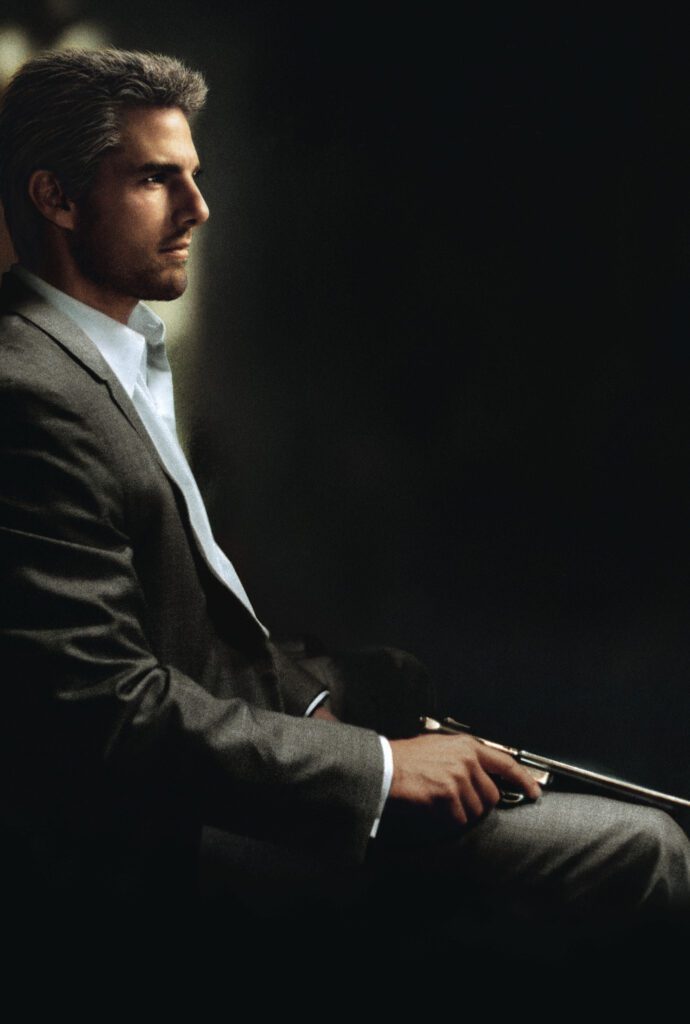
Collateral – (2004)
Introduction (Spoilers Later)
The neo-noir film Collateral directed by Michael Mann (who also directed brilliant action films Heat and Miami Vice) is set in the busy, disconnected Los Angeles, and begins by following a struggling cab driver (Jaime Foxx) named Max entirely through his daily cab route. Max is much like the rest of us: big dreams, with a foggy set of steps in his mind in order to achieve these dreams. His end goal is to save up enough money from his taxi job in order to start a luxury business on a tropical island.
A Turn of Fortune
The film follows Max throughout his daily cab route, until a passenger by the name of Vincent (Tom Cruise) gets in his cab, with bleached white hair, a fancy suit, and a black briefcase. They make small talk, and eventually reach Vincent’s destination. However, while getting out, Vincent gives Max a proposition: Vincent explains to Max that he is from out-of-town on a “real estate deal”, and has five stops to make, and if Vincent agrees to be his personal cab driver for the night, Vincent will give him several hundred dollars. Max agrees, and little does he know, Vincent is a cartel hitman, hired to kill five key witnesses involved in a high-profile court case. Max later finds this out when a man falls from a building onto his taxi windshield, as Vincent sprints out of the building wielding a gun telling him to get back in the car.
The Three Brilliant Aspects of Collateral
- Dialogue: The movie mostly follows a dialogue-central plotline. A hired cartel hitman (Vincent) and a local cab driver (Max) are stuck in an unfortunate circumstance together, as Vincent does not want to let Max go, noting that he is involved as an accomplice now. This setup is very unique in that the two are confined within a singular taxi for most of the movie. The two engage in philosophical arguments, including the meaning of life, the chance of the two of them meeting, and the reasoning behind Vincent’s chosen career. Max questions Vincent’s ideology, calling him “low” and interrogating Vincent: “What did those people do to you”? “How can you kill someone you don’t even know”? Vincent sits with these questions for a bit, until he responds, explaining his cold, detached, perspective. The film grapples with these questions, and as I can’t mention all of them, I encourage you to watch this starting at 1:00
“I’m an indifferent. Get with it. Milions of galaxies of hundreds of million stars in a blink. That’s us. Lost in space. A cop? You? Me? Who notices.”
“Look in the mirror. Paper towels, clean cab, ‘limo company someday’, how much you got saved? ‘Someday, someday my dream will come’? One day you’ll wake up and discover it never happened. It’s all turned around on you. It never will, suddenly you are old. Didn’t happen, never will, because you were never gonna do it anyway”.
If I wrote to the extent of my feelings on these lines and the overall themes in the film the blog post would be too long, but the nihilistic Vincent contrasted with the blue-collar dreamer archetype is a brilliant display of writing.
2.
Plot: The plot is a unique one, that I have not seen in action before. It follows Vincent and Max throughout one night almost entirely within the cab. That is one half of the plot. The other half follows a detective, who is a few steps behind Vincent and Max, finding the bodies of the victims as the hits continue. The detective and the police mention this style of taxi-hijacking has happened before, and although the detective is close, he is always a victim or two behind, and Vincent keeps getting away. I dont want to explain the entire movie, but these two plotlines converge near the end and contain a unique twist that challenges Max’s character arc. Max, throughout the entire movie, has been a symbolically passive man, who lets the world go by him without resistance. He has loose goals, and does little to pursue them. At the end of the movie, however, Vincent and Max’s roles switch and Max must face this difficulty head-on. Max’s character arc in this movie is well-done, as well as some foreshadowing for Vincent’s character.
3.
Sound Design: Michael Mann is brilliant in action movies. He might be the best directer for urban, gritty, action movies
Skip to about 1:00 in this video and simply listen to the scene as if you were there. If you have ever shot a gun before, you understand how realistic the sound was, echoing loudly off the urban buildings. Many top box office action movies today shoot their nerf guns and they make a sound that’s barely heard from a half-mile away. Michael Mann did the same in Heat and however this part of the movie may be minor, it enhances the quality greatly.
Leave a Reply to Prof L Cancel reply